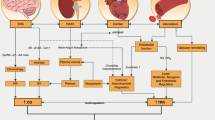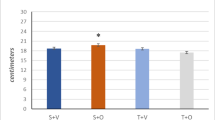Abstract
The effects of acute exercise on receptor-mediated endothelium-dependent vasodilation and its possible mechanisms were investigated in the presence of indomethacin. Male Wistar rats (16–20 weeks old) were divided into control and exercise groups. The exercise group ran on a drum exerciser until exhaustion, followed by immediate decapitation. Acetylcholine (ACh)- or clonidine (CLO)-induced vasodilating responses in thoracic aortae of the control and exercise groups were compared. Receptor-binding assays were performed to determine whether there were any upregulations of endothelial receptors after acute exercise. Our results indicated that acute exercise induced the following effects: (1) the dose-response curves of ACh and CLO shifted to the left; (2) the high-affinity M3 binding sites increased in number but not in affinity; (3) the α2 binding sites decreased in number but increased in affinity. We conclude that acute exercise enhances receptor-mediated vasodilation responses, at least in part, by regulating either endothelial receptor number or receptor affinity.
Similar content being viewed by others
References
Altiere RJ, Travis DC, Robert J, Thompson DC. Pharmacological characterization of muscarinic receptors mediating acetylcholine-induced contraction and relaxation in rabbit intrapulmonary arteries. J Pharmacol Exp Ther 270:269–276;1994.
Bockman CS, Jeffries WB, Abel PW. Binding and functional characterization of alpha-2 adrenergic receptor subtypes on pig vascular endothelium. J Pharmacol Exp Ther 267:1126–1133;1993.
Chen G, Suzuki H, Weston AH. Acetylcholine releases endothelium-derived hyperpolarizing factor and EDRF from rat blood vessels. Br J Pharmacol 95:1165–1174;1988.
Chen HI, Li HT. Physical conditioning can modulate endothelium-dependent vasorelaxation in rabbits. Arterioscler Thromb 13:852–856;1993.
Chen HI, Li HT, Chen CC. Physical conditioning decreases noreinephrine-induced vasoconstriction in rabbits: Possible roles of norepinephrine-evoked endothelium-derived relaxing factor. Circulation 90:970–975:1994.
Chen HI, Chiang IP. Chronic exercise decreases adrenergic agonists-induced vasoconstriction in spontaneously hypertensive rats. Am J Physiol 271:H977-H983;1996.
Chen HI, Chiang IP, Jen CJ. Exercise training increases acetylcholine-stimulated endothelium-derived nitric oxide release in spontaneously hypertensive rats. J Biomed Sci 3:454–460;1996.
Chen HI, Liao YL. Effects of chronic exercise on muscarinic receptor-mediated vasodilation in rats. Chinese J Physiol 41:1–6;1998.
Dauphin F, Hamel E. Muscarinic receptor subtype mediating vasodilation in feline middle cerebral artery exhibits M3 pharmacology. Eur J Pharmacol 178:203–213;1990.
Delp MD, McAllister RM, Laughlin MH. Exercise training alters endothelium-dependent vasoreactivity of rat abdominal aorta. J Appl Physiol 75:1345–1363;1993.
Fry AC, Kraemer WJ, Van Borselen F, Lynch JM, Triplett NT, Koziris LP, Fleck SJ. Catecholamine responses to short-term high-intensity resistance exercise overtraining. J Appl Physiol 77:941–946;1994.
Hammarstrom AKM, Parkington HC, Coleman HA. Release of endothelium-derived hyperpolarizing factor (EDHF) by M3 receptor stimulation in guinea-pig coronary artery. Br J Pharmacol 115:717–722;1995.
Howard MG, DiCarlo SE. Reduced vascular responsiveness after a single bout of dynamic exercise in the conscious rabbit. J Appl Physiol 73:2662–2667;1992.
Howard MG, DiCarlo SE, Stallone JN. Acute exercise attenuates phenylephrine-induced contraction of rabbit isolated aortic rings. Med Sci Sports Exerc 24:1102–1107;1992.
Knutson VP, Ronnett GV, Lane MD. Control of insulin receptor level in 3T3 cells: Effect of insulin-induced down-regulation and dexamethasone-induced upregulation on rate of receptor inactivation. Proc Natl Acad Sci USA 79:2822–2826;1982.
Lee NH, El-Fakahany EE. Allosteric antagonists of the muscarinic acetylcholine receptor. Biochem Pharmacol 42:199–205;1991.
Lowry OH, Rosebrough NJ, Farr AL, Randall RJ. Protein measurement with the Folin phenol reagent. J Biol Chem 193:265–275;1951.
McCormack DG, Mark JC, Minette P, Barnes PJ. Muscarinic receptor subtypes mediating vasodilation in the pulmonary artery. Eur J Pharmacol 158:293–297;1988.
Michel AD, Stefanich E, Whiting RL. Direct labeling of rat M3-muscarinic receptors by [3H]4-DAMP. Eur J Pharmacol 166:459–466;1989.
Moncada S, Higgs EA, Vane JR. Human arterial and venous tissues generate prostacyclin (prostaglandin X), a potent inhibitor of platelet aggregation. Lancet i:18–20;1977.
Palmer RM, Ferrife AG, Moncada S. Nitric oxide release accounts for the biological activity of endothelium-derived relaxing factor. Nature 327:524–526;1987.
Patil RD, DiCarlo SE, Collins HL. Acute exercise enhances nitric oxide modulation of vascular response to phenylephrine. Am J Physiol 265:H1184-H1188;1993.
Sim MK, Manjeet S. Muscarinic receptors in the aortae of normo- and hypertensive rats: A binding study. Clin Exp Hypertens 15:409–421;1993.
Sim MK, Manjeet S. Endothelial muscarinic receptors in the rabbit aorta. Eur J Pharmacol 163:399–400;1989.
Strobel G, Friedmann B, Jost J, Bartsch P. Plasma and platelet catecholamine and catecholamine sulfate response to various exercise tests. Am J Physiol 267:E537-E543;1994.
Sun D, Huang A, Koller A, Kaley G. Short-term daily exercise activity enhances endothelial NO synthesis in skeletal muscle arterioles of rats. J Appl Physiol 76:2241–2247;1994.
Tucek S, Proska J. Allosteric modulation of muscarinic acetylcholine receptors. Trends Pharmacol Sci 16:205–212;1995.
Author information
Authors and Affiliations
Rights and permissions
About this article
Cite this article
Cheng, LJ., Yang, CC., Hsu, LY. et al. Acute exercise enhances receptor-mediated endothelium-dependent vasodilation by receptor upregulation. J Biomed Sci 6, 22–27 (1999). https://doi.org/10.1007/BF02256420
Received:
Accepted:
Issue Date:
DOI: https://doi.org/10.1007/BF02256420




